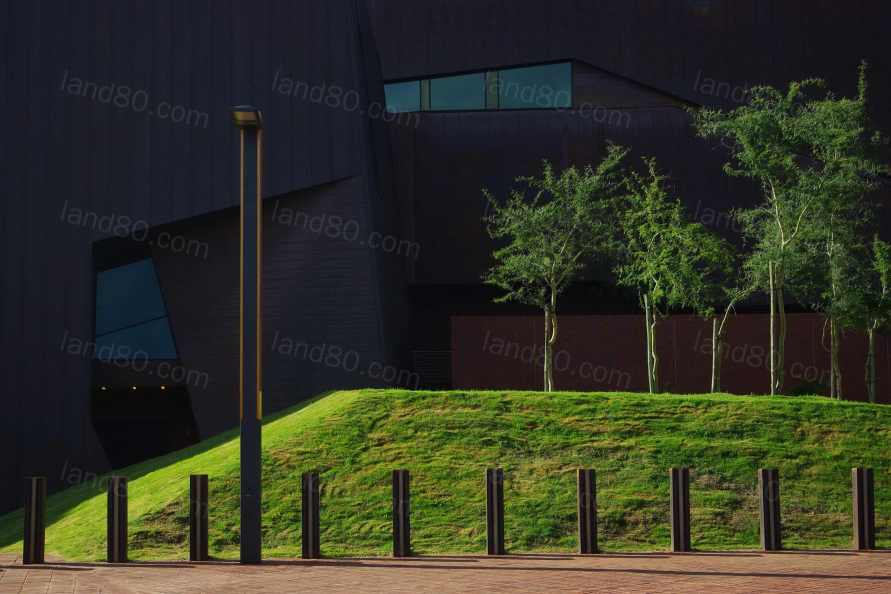//hapo在Khoisan语中意为
"梦想",这是南非茨瓦内自由公园脚下的重要博物馆的名字。博物馆、配套建筑和景观环境代表了自由公园项目的第二阶段,也是游客到达的第一站。
//hapo is the Khoisan
word for “dream”which is the name given to the significant museum atthe foot of
Freedom Park in Tshwane, South Africa. The museum, accompanying buildings and
landscape setting represents the second phase of the Freedom Park project and
is the first point of arrival for visitors.


这个阶段的设计方案相当复杂,但围绕着Khoisa人的谚语,//hapoge
//hapotama /haohasib dis tamas ka ibo;翻译成英文是: "直到它是一个社区的梦想之前,一个人的梦想都不算是梦想。"
The brief for this
phase is rather complicated in its context but revolves around the idea of the
Khoisan proverb://hapoge //hapotama /haohasib dis tamas ka ibo;
translated to English as: “A dream is not a dream until it is a dream of the
community.”


该公园是萨尔沃科普山 "花园 "中的 "花园",进而也是南非这个巨大花园中的 "花园"。自由公园不是一个传统的胜利或受害者的纪念碑,而是为了纪念为自由和人类而进行的长期斗争,并囊括了一种愿景,它试图在一个项目中拥抱所有南非人民,旨在维护和表达整个国家强烈的需求,以恢复和放大长期被剥夺的非洲声音。
The park is a place
of “gardens” within the “garden” of the Salvokop hill and, in turn, within the
vast garden that is South Africa. Rather than a conventional monument of
victory or victimhood, Freedom Park is in memory of the long struggles for
freedom and humanity, and encapsulates a vision which seeks to embrace all the
people of South Africa in a project aimed at asserting and giving expression to
an intensely felt need throughout the country to restore and amplify the
long-denied African voice.
▽项目平面图 Plan

游客们沿着Vhuwaelo开始他们的步行,这是一段螺旋式上升的沉思之旅,像项链上的珠子一样将
"花园
"空间串起来。//hapo是这些
"花园
"中的第一个,这个景观被构思成巨石和变质的岩石层,与创世故事对话。
Visitors begin their
walk along the Vhuwaelo, a contemplative journey which spirals up the
hill, stringing together “garden” spaces like beads on a necklace. //hapo is
the first of these “gardens,” a landscape conceived as boulders and
metamorphosed layers of rock that talk to the creation story.
▽螺旋上升的木质步道将人们引入花园 Vhuwaelo spirals up the hill, stringing together “garden” spaces like beads on a necklace

▽路上的南非元素雕塑 Sculptures of South African elements on the road

▽步道旁的美丽的城市景观 Beautiful view of the city when walking in the walkway

▽观景台上远眺城市全貌 A panoramic view of the city from the observation deck

然后,参观者会遇到//hapo三个核心外部空间中的第一个,"土著知识花园"(或称
"治愈花园"),这是一个衔接的水渠,将参观者带入一个安静、沉思的空间,向东眺望城市的联合大厦和美好的未来。由于非洲的土著知识无处不在,花园和Salvokop上使用的药用植物非常广泛,种植品种的选择和位置是由在这一领域拥有丰富知识的传统治疗师指导的。
Then, visitors encounter
the first of three core external spaces at //hapo – the Garden of Indigenous
Knowledge (or the Healing Garden) – an articulated channel of water which leads
the visitor into a quiet, contemplative space that gazes eastwards over the
city towards the Union Buildings and a propitious future. Because Indigenous Knowledge
is an all-pervading aspect of Africa, medicinal plantsused in the garden and on
Salvokop is widespread and the selection and location of species to plant was
guided by traditional healers who have extensive knowledge in this area.
▽治愈花园入口 Entrance of the Healing garden

▽穿过水景步道上的绿色走廊 Walk through the green corridor on the waterscape

▽郁郁葱葱的治愈花园 A wild profusion of vegetation healing garden

▽治愈花园内的“迷宫”增添了行进乐趣 The "Maze" in the healing garden adds to the fun of walking


第二个核心空间,Sentlhaga(或儿童花园),是一系列层叠的墙壁和梯田。图腾、水、开放的草坪和隐蔽的小径为儿童创造了一个与景观和彼此接触的空间。一个小型的草地露天剧场和橡胶地面为管理员和导游提供了更多的机会,通过松散的道具向孩子们传达博物馆中所涉及的概念,这些道具可以帮助讲故事--这是非洲的一种传统交流方式。
The second of the
core spaces, Sentlhaga(or children’s garden), is a series of cascading
walls and terraces. Totems, animated water, open lawns and hidden pathways create
a space for children to engage with the landscape and each other. A small
grassed amphitheatre and rubberised surfaces provide further opportunity for
caretakers and guides to convey concepts dealt with in the museum to the
children with loose props which can assist with storytelling – a traditional
way of communicating in Africa.
▽儿童花园概览 Overview of the Sentlhaga

▽小广场为曲径的小路带来一种豁然开朗的氛围 The small square gives the winding path an air of sudden openning

▽儿童花园内的喷泉水景 Fountain water feature in children's garden

▽种植的花草也能吸引人们的驻足 Plants could also attract people's attention

由于博物馆被设想为一系列的时代,应该是相互联系的,"巨石"(博物馆建筑安排的昵称)需要以圆形排列,以提供展品和讲故事空间之间的交叉流线。这就为中央庭院空间(核心外部空间中的第三个)和//hapo的核心提供了机会。空间本身很简单--一个统一的表面,点缀着丰富的萨凡纳植被的土丘,以及通往每个
"巨石
"开口的清晰通道。
Because the museum
was conceived as a series of epochs which should be interconnected, the “Boulders”
(the nickname for the museum building arrangement) needed to be clustered in a
circular arrangement to provide cross circulation between exhibits and
story-telling spaces. This provided the opportunity for a Central Courtyard
space (the third of the core external spaces) and the literal heart of //hapo.
The space itself is simple – a uniform surface punctuated by mounds of abundant
Savannah vegetation and clear access lines to openings in each of the “Boulders.”
▽项目灵感来源 Overall concept

Project name:Freedom Park //hapo
(Museum)
Company name: GREENinc Landscape Architecture + Urbanism
Website:www.greeninc.co.za
Contact e-mail:studio@greeninc.co.za
Project location:Pretoria,
Gauteng
Completion Year: 2013
Landscapedesign area (.0m²):15 hectares
Other participants:
Landscape Architects and Art Management: GREENinc as part of NBGM (a joint venture with Newtown Landscape
Architects and Gallery MOMO)
Architect: Office
of Collaborative Architects (OCA)
Project Manager:PMSA
Engineers: Africon
and Kwezi V3
Environmental Consultant: Earth
Inc (Thomas van Viegen)
Quantity Surveyors: Davis
LangdonChauké
Main Contractor: Fikile
Stocks Joint Venture
Landscape Contractors: Life
Landscapes and Earthforce Landscapes
Photo
credits:GREENinc Landscape Architecture + Urbanism
|